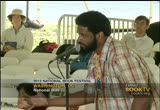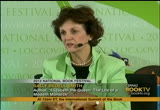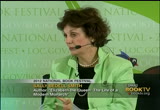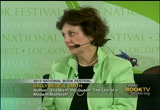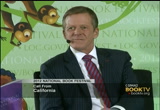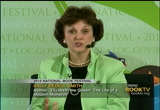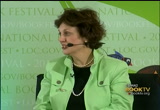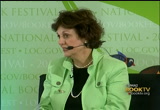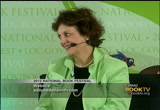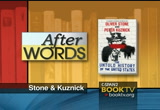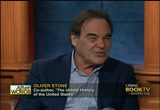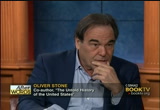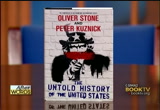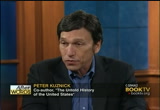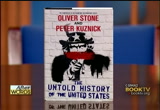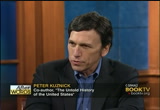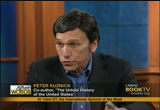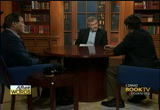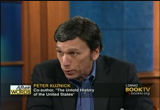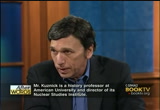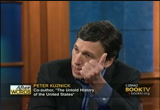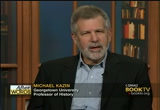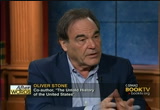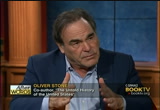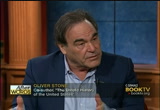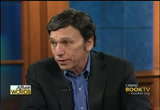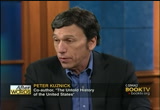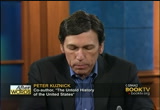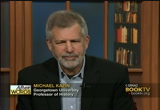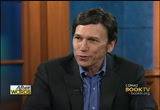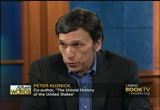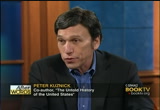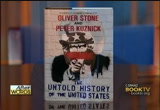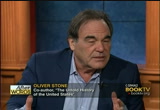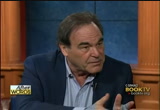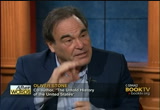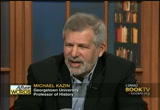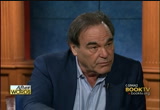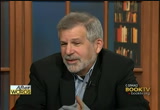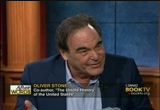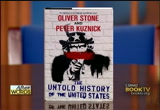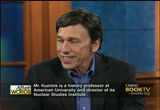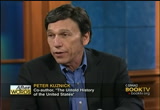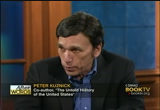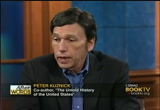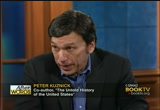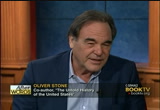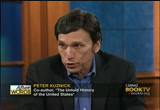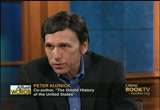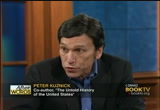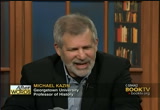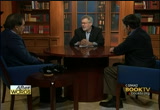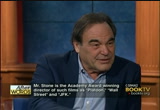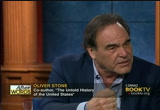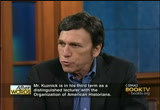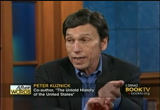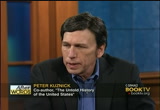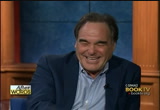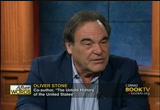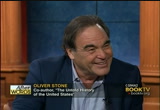tv Book TV After Words CSPAN December 29, 2012 10:00pm-11:00pm EST
10:00 pm
>> thank you for coming. doing your research for biographies, how important is it to devote questions before he and as opposed to asking questions they don't know about to get a more natural response? >>guest: i always do the latter and prepare a great deal to have a long list of questions. it is more valuable to have that spontaneous exchange. . .
10:01 pm
reading your book, maybe i am reading in to this but did you talk with the queen in crafting your book? >> well, the queen, as a policy and is probably sensible from her standpoint, which is that in her entire 60 year reign she has never given an interview and that has helped probably to preserve her mystique and is kept her from having to pick and choose who she might give interviews to. i was lucky to meet her three times and private social settings and i describe her three times in the book. at each of them was brief, but revelatory and in each case it gave little glimpses of that
10:02 pm
private side, that gaiety of spirit, the flash of wit and so, they were very valuable to me. i also watched her a lot in different settings. i traveled with her overseas. i traveled with her around the u.k. so i could see how she interacted with people. in addition to interviewing people there were lots of other ways that i developed my sense of who she is and how she goes about her job. >> was she aware that you are writing this book? >> she was, yes. she was aware. i initially approached the palace when i got the assignment from random house and wrote a very polite letter and got a very polite letter back saying we appreciate your interest and a lot of people are interested in writing about the queen. we have a hard time choosing
10:03 pm
somebody but fortunately i had a group of people who helped enormously with the diana book. some of them had worked for her. some of them were her relatives and they became my advocates. and went to her senior officials at buckingham palace and said yes she's an american, but she has a body of work that shows that she writes fair and balanced books and it would be a serious book. it would be a theory -- thorough book. after six months they briefed the senior press people and she gave them permission to give me their cooperation which was very helpful. >> pamela, orange california, good afternoon. >> good afternoon. it's a pleasure to be able to see and hear her. i've enjoyed her entire body of work but especially this seminal research that she has done on this fabulous figure in our
10:04 pm
lives. i think she has pretty much answered my question which was going to be how was she able to interview and get access to the people surrounding the queen and get all of her questions answered and i just want to thank you so much for filling in the background on this wonderful figure ms. smith. >> thank you. what was most fun was when the range of people i was able to talk to and again the help of ducking him palace was very valuable because i would get in touch with some of her close friends who were naturally a little nervous about possibly speaking and they would call the palace and the palace would say, we are helping her. use your own judgment and decide what you're comfortable with. so i got to talk to people who really knew her well and relatives send dog trainers and people who ran her estates and
10:05 pm
the manager, her horse trainers. it was crown jewelers, politicians who knew her and members of the clergy so what i loved with a book like this is getting many angles of visions, some quite intimate and some people who had very focused intent like the portrait artist for example. a very informal time with her and saw a whole different view of her than other people. >> finally sally bedell smith, why do we care about the royal family like we do? >> they are an extraordinary institution that binds britain together through their continuity, their connection to british history and today
10:06 pm
really, there's a term which is not terribly good but they call it the welfare monarchy. the queen and all the members of her family spends so much time supporting charities, can and should beating their names and their efforts and you know, they reward people for good works and they set an example of service. the queen of course has the extraordinary advisory capacity. she has led an exemplary life. she is the light above politics. she is one of the most highly respected leaders in the world. she has done all kinds of things behind the scenes to preserve for example the commonwealth which is a former british empire that could have easily fallen apart over issues like
10:07 pm
apartheid. she cares very much about the environment, about the small nations in the commonwealth that face particular challenges like the island nations. there are just so many things that she has contributed to that the british people feel indebted to her for having done. and as i have been going around the country, talking to groups, i detected a kind of wistfulness almost on the part of people. why don't we have somebody like this who can unify the country, who can be the light above politics? she perform some really valuable service. >> a elizabeth mcqueen is the name of the book, sally bedell smith is the author. thank you for joining us on booktv today. thank you all for being here. that is going to close out our coverage of the 2012 national book festival. thanks for being with us.
10:08 pm
this will all re-air overnight on booktv on c-span2. now more booktv continues. visit booktv.org to watch any of the programs you see here on line. type the author or book title in the search bar in the upper left side of the page and click search. you can also share anything you see on book tv.org easily by clicking share on the upper left side of the page and selecting the format. booktv streams live on line for 48 hours every weekend with top nonfiction books and authors. booktv.org. >> up next on booktv, after words, with guest host michael kazin and coeditor of dissent magazine. this week oliver stone and historian peter kuznick discussed "the untold story of the united states," a companion book to their documentary series. in it they argue that u.s. leaders must chart a course for
10:09 pm
the future by first facing what they call the country's troubling history of drifting further away from its democratic traditions. >> host: hello peter and oliver. i've taught with peter at american university. let me start by having both of you talk about the theme of this and how you wrote it? >> guest: i was invited in 1996 to go to this class at american university researching oliver storms america and one of the classes i was very popular. i went very impressed with it and the range of students and afterwards peter suggested that there was a great story about the atomic him in the atomic bomb always fascinated me because i was born the year
10:10 pm
after it was dropped and it was in new york city, the center of the world and my father was republican and a conservative. he served in world war ii as eisenhower said the bomb was the umbrella, the mushroom under which it grew and anything we did was in the shadow of that. so i was curious about it and the bomb story really does have another origin. the book about the scientist of the 30s and above all the mentioned this figure about henry wallace and how he could've been president in 1944 but he was bumped by the political bosses. that led of course to the 45 decision by truman. then we begin the origin of a great idea for a documentary or a movie and he wrote a script. it didn't work for me, but 10 years later it haunted me that story in washington and he is still teaching a class when i came back. we decided to go ahead and do
10:11 pm
it.mandari about wallace and the bump. that one hour turned into ultimately -- our eyes are bigger than our stomachs and we tried a 12 hour national security state story from the 1940s to now and it actually started in 1900 with the philippine american war but the spanish-american war and then in 2012, we started 1940 in the series. the book two years after our series we decided hey this is getting very serious and we know i'm going to be called on this because of my back round in making movies. people will say this is part fiction and part fantasy that we decided to go ahead and go with this book. peter took over the book. i was running the series, the film and we were cross fading all the time and checking each other constantly but it took about four and a half or five years now and that is where we are today. >> host: go ahead. >> guest: we have been friends
10:12 pm
for that whole period since 1996 and then we decided we were going to go ahead with this project and i have thought we could do it in that year and it would be a 60 minute documentary. i got to see oliver new york two weeks later and we did a 10 hour series. what i felt would take one semester ended up taking four years, four and a half years. i was surprised how little information you can convey in a 60 minute documentary. each episode. the book goes to an 800 page book and we cut out 172 pages to get down to 800 pages. we also wanted to get the footnotes in the sources and much more detailed discussion of this material because we know it's going to be challenged and we are offering a perspective that is not a mainstream perspective and we wanted to have our sources out there when we did get challenge. >> host: and it was addressed
10:13 pm
to people like my daughter and my sons who had been at the high school level history. you could read this book and see this documentary and it's tough but you could understand it at 16 or 17. at college level you start to specialize in much of this is available to students. we really wanted to -- my daughter's history books even today when you get for example to the hiroshima, there is no mention of an alternative possibility. the americans had to drop the bomb to save americans lives because the japanese -- you don't hear about the russian side of the equation and you don't hear about the other choices that could be had. >> host: it stirred up a little controversy and expected it to. something that obviously historians argue about and will and have already elicited
10:14 pm
commentary. the cold war is obviously essential to what you are writing about here and to the film. and, perhaps i'm wrong but as i read it you'll argue pretty much that the united states is primarily to blame for the war, that stalin and the soviets would have been, would have been open to welcoming a continuation of the wartime alliance between the two countries but it was american actions primarily with some allies, the british for example which began the cold war. is that an accurate portrayal? >> guest: i would say that's accurate. we certainly don't consider stalin blameless in all of this and they certainly don't downplay stalin's fertility or the terrible things that were done in the name of the soviet union under stalin's leadership. i think that's important a factor in that if you look at
10:15 pm
the broad history of the united states relationship with the soviet union beginning in 1917 and 1918 when the united states first sent troops into the soviet union as part of a broader counterrevolutionary force led by the british, then the united states to refusal to recognize the soviet union until 1933 under roosevelt, and then in the 30s the soviet union was pushing very hard for international consensus and trying to stop hitler. that led to anti-fascist forces globally in the communist in the anti-fascist movement in the united states after that but during the war after germany attacked the soviet union in 1941, then the united states and the british decide that it's important for the soviet union is to keep the soviets in the war. they were caught so offguard that the british were concerned that the soviets would
10:16 pm
capitulate at that point that the united states offers several things. the soviets made several demands and they promise matériel and they had a hard time delivering that for a number of reasons and for a couple of years. stalin said if you give them airplanes and other equipment we need to stay in the war, the united states tries under the effort of other people who are not quite assistance air in providing that so the second man was they wanted the same territorial concessions they have gotten from hitler in 1939 pact that their main demand was for the second front. they were fighting and the history of this period, the americans and the british throughout most of the war were fighting 10 nazi divisions combined and the soviets alone were fighting 200 through june of 44. and so, they were desperate for the united states to open up the second front to western europe and the british. roosevelt's stalin to send molotov the top general to
10:17 pm
washington in may of 42 and in june of 40 to the united states issued a public statement saying we are going to open up the second front before the end of the war, before the end of the year 1942. we promise that publicly and get we don't open up the second front until june of 44 and that is partly because the british refused to go along with this. the united states and the british get involved in what marshall calls peripheral and marshall and eisenhower opened up a second front and the united states when instead to basically defend the british empire. there was going to be a lot of mistrust between the united states and the soviets particularly during the war. the seeds of the cold war actually are visible during the war. in certain tensions of course because the second front is the
10:18 pm
soviets had on their own and largely defeated the germans after stalingrstalingr ad and for pushing toward central europe and eastern europe. said the united states lost their military initiative by that point and we had lost the diplomatic so there are certain deals being made, deals between churchill and stalin in october of 44. dividing up -- the british forget 90% of greece and the russians would get 90% of bulgaria and hungary and they divided up that way. it was pretty cynical. but when roosevelt dies, in april of 45, his last telegram to churchill was, we always have these minor disagreements with the russians but we end up resolving them. so let's not make a big deal. there's no reason we can't
10:19 pm
maintain friendship after the war. when truman gets in there on april 12, 1945, immediately takes a different course. roosevelts alliance with the wartime alliance with the soviets was still strong at that point the truman turns to advisers who roosevelt never trusted in the first place and didn't pay heed to. people like burns and second day he flies burns through his private plane and burns gets german the same message. the soviets are breaking all of their agreements and they can't be trusted. and so what we are going to see is within two weeks the u.s. policy toward the soviet union's going to change in april 1945. by the time there's the big meeting on april 23 with molotov and on april 23, the united states had changed course. and so at that meeting truman
10:20 pm
and molotov meets with his advisers and they are divided. stimson, marshall, leahy are all telling him don't rake with the soviets. stimson says very clearly, stimson secretary of war and he understood and he says the soviets have a much better understanding of their own security especially around poland and we do. >> host: if i could and drop for a minute, stepping back from those details do you think it was realistic for these two powerful nations, continental powers each of whom had i think it's fair to say an empire, one informal and won a little more formal because the soviets obviously had different smaller states under their control and couldn't keep control of the baltic states are moving into eastern europe with the red army dominion wasn't realistic for these two powers of very different ideological bases to really get along and were they really destined to have a cold war and luckily never really had a hot war except through
10:21 pm
proxies. these details are important but who knows of course if roosevelt roosevelt -- and stalin as you know himself through the heads of the french communist party told the american communists in april 1945, get ready for the class were to continue in effect. don't believe that peaceful coexistence is really going to last. around the same time as roosevelt is dying actually. did you want to chime in on that? >> guest: u.s. specific questions about the french and you want to do with that first? >> host: the larger question. >> guest: not a cent historian but looking at world war ii in a different aspect than i ever did as a young person when it was victory at sea. what i'm talking about is i would not downplay the british empire. that's the biggest empire of all. we are a coming power and so is russia because they grow during the war.
10:22 pm
don't forget they armed themselves and they remake themselves. it's an extraordinary story of migration reconstruction and dedication to the people in the losses of the soviets, whether it's 22 or 27 million whether stalin kills, doesn't matter. the ideas the whole nation plunged and there was a crucible for them, a great war. the british, churchill is a fascinating overlay on this because he has a different motive it seems. once the british islands are saved by the battle of britain, his goal seems to be truly to regain the empire. he said it did not become prime minister to dismember the british empire. and the whole concept of going to north africa, sending troops off to the southern nazi empire in italy in the balkans, regaining greece which is a tremendous story. ever in talks about history of europe and as an outsider i'm saying what about the british
10:23 pm
when they went back in 1944 and started divebombing the streets of athens and killing the people, communists are sisters who thought -- fought valiantly against the nazis. the british were ruthless and that is never pointed out by the people who say look a what stalin did in poland and he broke the altered. they don't believe he broke the altar. look what the british did. no one points to that and what we did increase in the cold war or period, the early cold war period in the truman doctrine of 47 to 49. we had american advisers in early vietnam were over in this. the british goal is truly suez, get back the meta-training, get the oil regions and get i ran back, this conflict in iran in 1945. beyond that, it was india crucial to the empire and we show that in the beautiful maps and beyond that he gets to the
10:24 pm
far east. is the richest resources in the world that belonged to britain, not us. that becomes -- that's not a subplot. is a key plot so you can't talk about u.s. soviet relations without talking about the british empire. >> guest: three points, the cold war and the beginning and most americans have no idea and have no idea what role the british were playing but roosevelt did and roosevelt was very critical of the british empire as was his vice president from 41 to 45, henry wallace who dismantled the french empire, the portuguese in the dutch. they were very anti-colonial. truman as we know lets them back and then encourages them and gives them aid and support. and then it gets assembled in vietnam. a lot of the turmoil that we are going to later face but part of the question we we are raising is a fair and important one.
10:25 pm
we don't know if there would have been a clash between the americans and the soviets. we had different interests that we had a very good wartime alliance. at april 23 crucial meeting, marshall and simpson both made the point that not only have the soviets been good wartime allies, they often delivered more than they had promised so they both were confident that there could be post-war friendship. eisenhower was sure at that point. he didn't begin to doubt that until august 6, 1945 when he got word of the atomic phone so eisenhower felt strongly and roosevelt had felt strongly along those lines. that is why was focusing even those two weeks how rapidly things changed in the first two weeks and truman takes over. takes over. truman comes in andy's way over his head which he admits to everybody. everybody. he had this recurring nightmare is vice president that there had been a knock on a store in the middle of the night in the secret service would come and
10:26 pm
say the president is dead. that was his nightmare and it was his nightmare for good reason. he was not chosen because he was qualified to run but he first chosen in 1944 to run for the senate. he is asked by the newspaper's 42 choose harry truman to run for the senate? he said i want to show the world that a well run machine can take an office boy in the election to the senate and truman in's first term there is considered a senator from prendergast. even in his second term he develops more of a national reputation but he is not expert on any of these issues. so he gets in there and write from the beginning every meeting he has with people he says this is a terrible mistake. i'm not take enough and i'm not smart enough and april 13, his first day in office mates meets with the reporters at the capitol. he said voice if you pray for me now, i don't know a few ever had
10:27 pm
a load of hay fall on you but i feel the moon and stars and all the planets have fallen on me. good luck mr. president. truman says i wish you didn't have to come me that. host go. >> host: back to henry wallace is perhaps the unsung hero of your book and i know as oliver was saying thinking about working on a screenplay a while back about while this. this is one of the great counterfactual's of modern american history. what if wallace had gotten nominated in 1944? in your book, he came closer than senator claude pepper from florida was about to nominate him and you argue that the convention would have gone along with that and he was much more popular certainly than the other people there. however, i do want to press you a little on that because and i think probably the best biography of wallace by culver and hi called the former senator
10:28 pm
from iowa, they make it really clear based on their evidence that fdr did not want wallace to run and he did say nice things to wallace who was in office in july of 1944 but that very evening he meets with people who are very dead set against wallace, the machine so to speak who did not like wallace wallison people from missouri and others. and according to culver hide wallace is named as in. they only talk about truman or douglas as possibilities. so if wallace had gotten the nomination, he might be running the dying man who did not want him on the ticket. so. >> guest: i have a very different rating having been through every piece of that information for a long time.
10:29 pm
>> host: on the biographies. >> guest: that is a valid perspective on this. roosevelt in 1944 was getting very ill. the party bosses knew that he was feeble and there was almost no chance he would survive another term. they decided that they were going to firewall is off the ticket. it was run by bob hannigan the national chairman who ran the st. louis machine that got chairman rehab acted in 1940 and ed pauly. at holly was the kolshorn yet oil millionaire who said i went into politics when i realize it was cheaper to elect a new congressman to buy the old one. he leaders going to get indicted for good reason. >> host: his name is on the -- >> guest: the build alien -- the pavilion, exact way. they decided they would try to surround roosevelt with all the people who were hostile to wallace if wallace is on the
10:30 pm
ticket. in 1941 when henry luce made his famous speech wrote his editorial saying the 20th century's going to be the ends century and the united states is going to dominate the world economically and military old and culturally coming made a famous speech. the 20th century should not be the american century, should be the century the common man so what we need is the worldwide people's revolution in the tradition of the french, the american, the latin american and the russian revolution and called for ending imperialism and cartels and the economic of quotations spreading science and technology around the world. and he had enemies. his enemies were the southern segregationist, the antifeminist because he was the leader for women's rights women's rights in the anti-imperialist and can service. he said america's fascist think
10:31 pm
wall street comes first in the american people come second. he had enemies and those enemies wanted to get rid of him on the ticket. the problem was he was enormously popular. on july 20, 1944 the night the convention starts the potential potus who they wanted on the ticket as vice president, 65% said they wanted wallace on the ticket in 2% wanted harry truman so the question where how worth it party bosses going to take to this? when they wanted to get wallace off the ticket roosevelt says to him my support wallace but i can't fight this campaign myself. i'm not strong enough and i'm depending on you to do it. they finally gave in and it was terrible that he did. his family was serious. eleanor roosevelt was furious with him. every single one of the roosevelt kids were furious with him. wallace had the backing of labor and all all the blacks and the progressive so there was a fight between the conservatives of the party and still today the
10:32 pm
democratic party and the southern segregationist. is still that kind of fight. roosevelt did not have the gumption to fight at that point and he lost that strength but he said to wallace publicly at the convention, if i were delicate i would vote for henry wallace but it's tragic as we say in the documentary, it's tragic he didn't have the strength to fight at that point for wallace. >> guest: i sense in your opening question michael that you were pointing to the forces of history and i see the marxist leninist side of this. the forces that push history. [inaudible] >> guest: wallace would have been opposed in the forces were ultimately between this capitalism versus communist ideology would clash and that
10:33 pm
would be the end of it and that of course was a subject of the february 46 speech stalin made that was misinterpreted by the west about the two systems. that speech was made by the hawks in the conservatives but in fact when you read the speech -- >> host: the iron curtain speech. >> guest: that goes back to churchill which is to step up in the cold war and we go when those months by months from july 45 breakthrough march 46 when churchill gives this incredible speech. again i'm coming from the outside. you have studied this all your life but i'm fascinated by the 30s and we did a chapter on the 30s and also the woodrow wilson period. what happens is the concept of communism has many faces in america but certainly labor ties to the idea, some of the ideals
10:34 pm
of socialism and we see it in deb's and all the union movements of the 70's and in the relationship to the french collectives of the 18 70's in the 18 30s. the working man's rights, the farm movement and the progressive movement. it wilson puts a stop stop on it. he comes down and deb's goes to jail. bill haywood and emma goldman and all these people disappear and were thrown out of the country because they resist world war i. these are the forces that move american towards this place we are going to. i'm curious to know what you think those forces are? where the labor movement is going to end up. i think peter and i would argue that there are moments and pivot points where there can be a wallace that can make that convention moment where there can be a candidate that does this. >> host: which could turn.
10:35 pm
>> host: >> guest: which could turn again and it turned in the past. that was his first question. >> host: i'm supposed to interview you. you know i think there's a big difference between someone like deb's and emma goldman and especially communists in power, when emma goldman goes to the soviet union and in 1920, 211th supported in 19. they were being one -- rounded up and killed and quite rightly it's radical system even though it was a system that did industrialize the country with a tremendous cost. so, i comment it as an anti-communist leftists, someone who thinks that stalin was a horrible mass murder and one of the worst in history and yet at
10:36 pm
the same time i agree with both of you that the united states is hardly blameless and did a lot to exacerbate that rivalry and hostility. we have to take a break in a second but when we return, i would like to sort it move forward to kennedy and talk about the clearly dramatic turning point that did not turn, the cuban missile crisis and also but vietnam. >> guest: you said the american capitalist, most were very concerned about the labor movement. >> host: they still are as you know. >> guest: exactly, that's my point. the 1930's of the key threatening moment enduring the strikes of world war ii and more strikes in any time in our history. there was tremendous dissatisfaction right after the war in 45 and 46. it goes all through the film but
10:37 pm
there is just location in american life. isn't as convenient for the bosses and the owners in the upper elites to deflect the tensions that exist in the american life by pointing to stalin and the communists and saying, this is the enemy? >> host: of course, of course. the red scare was a scare against the communist party which was declining quickly after the 48 progressive party debacle for example and of course the cold war. at the same time one can say the american right and let the corporate interest you said fear i think to turn people against labor and at the same time without denying that what the soviets were doing in eastern europe was taking taking away people's independence and taking away democracy and killing
10:38 pm
dissidents. >> guest: where is the energy? the energies in the united states. stop the strikes, stop labor. and i think stalin has always been convenient for distraction for the right in the center, the truman nights, the center up to today. >> host: i just think the fact that the communist were doing what they were doing also made it easier for the right to use that. >> guest: and to scare people in this country. >> guest: when you see all the liberal so to speak, and also the chairman liberals, the clark clifford's that would drift in this direction, changes american history terribly because right now with the union movement, the concept of labor versus capital is not even discussed in this country. this is what has happened and this is far more important than
10:39 pm
pointing the finger at the soviet union. why not point it as i said earlier at churchill in greece in athens in 1944? let's be a little bit more -- host go egalitarian. we will jump forward after this. >> host: okay, i would like to jump forward to the 18 60's, the late great 18 60's and talk about john f. kennedy still perhaps the most beloved president in american history at least the memory of people alive
10:40 pm
during those times. clearly one of the most germanic and various defense of this presidency was the cuban missile crisis in october 62 which all of us lived here as teenagers. talk a little bit if you would about how you think that crisis came to be and why it didn't result in a nuclear holocaust? >> guest: khrushchev actually made a big blunder in the cuban missile crisis and that was not just putting the missiles with nuclear warheads into cuba, it was not announcing that he had done so. he undermines his own deterrence. what he was trying to deter was the u.s. invasion of cuba. the united states have been planning an invasion and in fact we had a mock invasion planned
10:41 pm
for october of 62 called operation -- after the bay of pigs. or cusack as castro spelled backwards. the u.s. was in heavy planning mode for an invasion to overthrow after the disaster of the bay of pigs. we had also been running operation mongoose which was other contra insurgent should -- counterinsurgency program so was clear the u.s. was planning an invasion. khrushchev thought he could kill two birds with one stone by changing the balance -- that the united states was so far ahead in missiles and the ability to do liver warheads that he thought if we could put the intermediate-range listed missiles into cuba that was somewhat offset america's big advantage of nuclear weaponry in 1962 and it could deter a u.s. invasion of cuba. the mistake he made was not announcing that the weapons were there and not announcing that he also had 100 battlefield nuclear weapons and that it united
10:42 pm
states does not find out until 1992. he almost passed out when he found out about that, so -- >> host: host of the secretary of defense. >> guest: the secretary of defense of the soviets put the missiles in cuba and the united states discovers that there are surveillance flights over there and then the tension builds. we have a quarantine and a blockade around cuba and one of things that happens during that time is that the soviet submarine is found by american ships and they start to drop missile charges, depth charges on the soviet submarine. they knocked out the electrical system. the carbon dioxide was rising and people were passing out inside a simmering. they had no communications with the kremlin. savitsky says load the torpedoes, let's attack. the war had started above already. we are not going to be doing
10:43 pm
somersaults down here when the war is starting. to launch the nuclear torpedo they set it leading to -- ready to launch. fortunately my view the commanders on on a lower rank talked them out of it. arc up off my to save the world, this unknown soviet subcommander. he talks of iski out of launching the nuclear torpedo. had they launched the nuclear torpedo world war iii would have started right there. but even after that, he came close to planning the invasion. it's amazing how little we knew about what we were going to find. we had 33 the 42 ipr am sore located. we had no idea what the nuclear warheads were. they never discover them. our plan was to invade and also to bomb and destroy the soviet facilities there. we later found out, we assume
10:44 pm
the soviets had 10,000 troops there and there were 100,000 armed cubans. we later find out that the soviets had 43,000 troops there and there were 270,000 armed cubans so our initial plan was if we invaded we would take 18,000 casualties and 4500 dead. and macnamara found out how many church are actually there he said that would have been 25,000 dead and then he found out they also had 100 battlefield nuclear weapons they were using american forces. 100,000 americans would have been killed and we would have absolutely destroyed cuba and very likely taken out the soviet union also. so we came that close to it. fortunately kennedy and khrushchev are both doing everything they could to try to prevent a nuclear war. they finally succeeded but became very close to them not succeeding. kennedy said the chances were one out of two that we had nuclear war and khrushchev thought they were even closer than that. he thought the missile invasion
10:45 pm
10:46 pm
10:47 pm
kennedy. they were furious. but christian of reaches out and kennedy responds but we realize norman cousins goes over and he is frustrated. >> that was an important magazine. but kennedy responds he already had the solution that made people angry but the space race was the signature initiative. why should we compete? let's collaborate he gave a strong intention to pull out of vietnam. his american diversity speech the best in the
10:48 pm
20th-century, he has a few but this is a great great speech in june 1953 that says let's end the cold war. he is reaching out to a limited area with a series of victories and kennedy learned other lessons. after the bay of pigs, do not trust the cia or the joint chiefs they call them a the bastards and scatter them in the wind and tear them into pieces and calls them son of bitches and puts
10:49 pm
them as ambassadors. these and other things with the change of mind with the cuban we see a visionary kennedy. >> why you call your airport dulles? and reagan? and thurgood marshall. [laughter] >> one of the last name to have been while kennedy was alive was if the assassination of south vietnam with our ally but then he is assassinated. this raises the question
10:50 pm
fifth over the next 50 years to argue about, would kennedy have told fed advisers out of vietnam? and you argue indications are that he would have. just to challenge that a little bit and, there is a wonderful book called choosing war that they say the viet cong attacks were doubling in november from the month before in south vietnam and tear the top advisers to honolulu and
10:51 pm
they warned the viet cong would win if the u.s. did not do something quickly. not to challenge those memories but wouldn't it have presented kennedy with a difficult choice? losing to a peasant army which was beat back by the soviet union? >> kennedy was under pressure with the enormous way and the bay of pigs and said no. that meeting in honolulu was mentioned to me years ago it was very strange they are
10:52 pm
meeting in honolulu. arad of the country when the president was killed. fascines johnson met quickly before kennedy was buried with and clearly indicated he would reverse a the kennedy policy and then initiated that allowed in the current warfare but said johnson approach is interesting. but then later in his life after he lost the presidency said i gave up the great society because i did not
10:53 pm
want to lose. the concept to be seen as weak haunted johnson. but not kennedy. he had seen suffering he saw a deceit and a new that. and his brother robert was eloquent. >> that is an important point*. after the tet offensive they also interviewed robert kennedy and they said if no combat troops we would not have gotten out and they said have come you were so
10:54 pm
smart? and they say he almost jumped out of his seat when robert said we were there. we saw what was happening. and that we've led have said we were invited to leave. the. >> and kennedy kept on to meet with macarthur. but remember robert gates and afghanistan? they were both right to but mcnamara had blown up the plan to take the battle troops out before 1963 and all of them by 1965. but what of the 90th statia -- yet is states was
10:55 pm
losing? to take them out anyway. kennedy mentioned i cannot do it now so we will lose the election after i am elected i will do it he said tip o'neill and others. >> the list could be the war that when those in vietnam where the territory? perhaps by the election it would have been a major issue. >> it could be counterfactual but kennedy said to argue is me about unemployment he can refuse
10:56 pm
to me but with that intelligence community i used to assume they had a special knowledge and then said i will tell my successor not to trust the military station military or joint chiefs. >> and then had the generals a pressing him on afghanistan. >> has the foreign policy change? and has been more than 20 years. and does the u.s. still see the world doesn't oyster to
10:57 pm
be cracked open? >> you and your own question. [laughter] i want to hear you and towel 9/11. >> i am not a historian. it is a heartbreaker. there was a season of peace with the reagan and gorbachev with nuclear arms then bush comes into office and of course, dukakis was my choice is a trumans stalin moment. going into eastern europe to let nato take over germany these things are in the air.
10:58 pm
bush? >> host: square. he does business as usual with china and goes into panama december 1989. the american people loved it it was our backyard. me noriega was the news dahlin. and that is another untold story. and with the doctor of the photos it breaks my heart personally send a the veteran we don't take
10:59 pm
advantage of the possibilities with the soviet union reprivatize with russia and then 43, and it is natalie squandered but it is heartbreaking during that period. >> it is a lost opportunity. i agree. >> march 5, 1953 when stalin died the soviet leader's reach out to the united states at that point* but eisenhower had a great speech but then dallas refutes it then they take a hard-line. >> we had a lot of chances.
145 Views
IN COLLECTIONS
CSPAN2 Television Archive
Television Archive  Television Archive News Search Service
Television Archive News Search Service 
Uploaded by TV Archive on

 Live Music Archive
Live Music Archive Librivox Free Audio
Librivox Free Audio Metropolitan Museum
Metropolitan Museum Cleveland Museum of Art
Cleveland Museum of Art Internet Arcade
Internet Arcade Console Living Room
Console Living Room Books to Borrow
Books to Borrow Open Library
Open Library TV News
TV News Understanding 9/11
Understanding 9/11